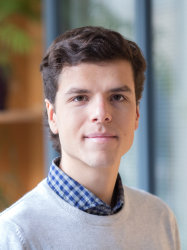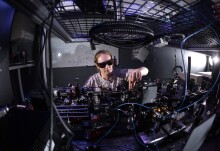

Israeli crystallographer Professor Ada Yonath delivered Imperial's annual Ernst Chain lecture this week, which focused on the future of antibiotics.
Professor Ada Yonath won the 2009 Nobel Prize in Chemistry, along with Venkatraman Ramakrishnan and Thomas A. Steitz, for her pioneering studies on the structure and function of ribosomes.
It seems that we will soon revert back to the pre-antibiotic era, when simple pathogens could cause very severe infections. Something has to be done.
– Professor Ada Yonath
Ribosomes are organelles found in all living cells, which synthesise the proteins required for cells to carry out their function. Because of the fundamental role played by ribosomes, they are the target of many antibiotics, designed to paralyse them in pathogens.
Professor Yonath spoke about the problems surrounding antibiotic use today, which include environmental hazards and the appearance of multi-drug resistant bacteria, as they evolve to outsmart antibiotics. Going forward, she proposed that most of these concerns can be minimised by designing new, potent, antibiotics that are specific to each species of pathogen, instead of using the broad-range antibiotics that are currently favoured.
She explained how antibiotic resistance can arise and outlined some of the main concerns: “The increasing appearance of multi-drug resistant strains, together with the negligible number of new antibiotic drugs that are presently undergoing development, is becoming a very big problem.
“It seems that we will soon revert back to the pre-antibiotic era, when simple pathogens could cause very severe infections. Something has to be done.”
We expect that pharma companies will consider human aspects, not only profit.
– Professor Ada Yonath
Another danger of antibiotics is the potential damage that they cause to the microbiome, composed of trillions of non-pathogenic bacteria in our gut. Changes to the composition of the human microbiome can cause disease.
Professor Yonath also warned of the environmental threats posed by antibiotics, which are less often discussed. Most antibiotics are made up of small, toxic, organic molecules that cannot be digested and are therefore expelled into the environment.
“They are so small that most purification facilities cannot catch them, so they penetrate irrigation systems and eventually come back to us,” she said. This feedback process contributes to the prevalence of antibiotic resistance.
Specific solution
The solution Professor Yonath suggests to mitigate these problems is to design new, species-specific antibiotics. Using data from her studies based on X-ray crystallography, a technique used to visualise the three-dimensional structure of molecules, Professor Yonath demonstrated how antibiotics could target molecular structures that are unique to each pathogenic bacterium.
Scientists could use this method to identify molecular regions that are present in pathogens but not in harmless bacteria. They can then design advanced, degradable antibiotics that target these regions and are effective only for the target pathogen. This will reduce environmental hazards and combat the spread of resistance.
However, Professor Yonath warned that the proposal is not without its challenges. Diagnostic techniques must improve, as doctors will need to quickly and correctly identify the disease-causing pathogen before they can prescribe the specific antibiotic. She also noted that the solution is economically challenging, although in this regard she remains hopeful:
“Most drug companies don’t invest in new antibiotics because there is a mismatch between development expense and profit. Pathogen-specific antibiotics are even less profitable than broad-range antibiotics. However, we expect that pharma companies will consider human aspects, not only profit.”
Will we ever completely eradicate antibiotic resistance? “It’s unlikely,” Professor Yonath said with good humour, “because bacteria want to live, and they are cleverer than us!”
Article text (excluding photos or graphics) available under an Attribution-NonCommercial-ShareAlike Creative Commons license.
Photos and graphics subject to third party copyright used with permission or © Imperial College London.
Reporter

Bruno Martin
Communications and Public Affairs

Contact details
Email: press.office@imperial.ac.uk
Show all stories by this author




Leave a comment
Your comment may be published, displaying your name as you provide it, unless you request otherwise. Your contact details will never be published.